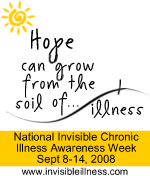FIBRO AND WEATHER
Scientific studies that PROVE what so many of us THOUGHT was true...that the barometric pressure DOES make us sicker! It raises the inflammation "cytokines" in our blood!
"Summer Weather Adding to Your FM Pain?
The weather is warm and the skies are mostly sunny, so why are you feeling so lousy? It may be the storms or constant changes in summer weather patterns that are causing your increased symptoms.
"Summer Weather Adding to Your FM Pain?
The weather is warm and the skies are mostly sunny, so why are you feeling so lousy? It may be the storms or constant changes in summer weather patterns that are causing your increased symptoms.
Daniel Wallace, M.D., who treats FM patients in the Los Angeles area, noted from his clinical experience that changes in the barometric pressure are more important than whether it is hot, cold, wet, or dry. A study done in Cordoba, Argentina followed patients with various rheumatic diseases that may co-exist with FM (rheumatoid arthritis, RA, and osteoarthritis, OA) as well as a healthy control group. All patients were asked to record their pain on a daily basis over a 12-month period. Researchers followed the temperature, humidity, and atmospheric pressure during this time. Patients with FM reported more pain when experiencing cold temperatures and high atmospheric/barometric pressure. High barometric pressure occurs when the skies are clear and low pressure occurs when storms move in. It is hypothesized that increases in barometric pressure could lead to increased production of pro-inflammatory cytokines, which correlate with the pain intensity experienced by FM patients.
Another study done in Norway, noted that patients who have lived with FM less than 10 years were more weather sensitive than patients who had the illness more than 20 years.
But while patients seem to report more flares in January, watch out for the summer storms because they cause dramatic fluctuations in barometric pressure. The summer and fall seasons are usually full of weather changes that may zap your energy and intensify your pain. If you live in the hot Southwestern United States, try to stay out of cold, air conditioning drafts. Dress in lightweight but layered clothing so that you do not swelter in the outdoor heat or shiver in the grocery store and other chilly environments. If you live near a coastline, get extra rest and take care of yourself during the summer storms.
Your ability to tolerate the heat might also depend on your gender. In general, women prefer warmer climates more so than men because of differences in the way their sympathetic nervous system operates. When subjected to hot environments, this system constricts the peripheral blood flow more in women than in men. The result is a cooler skin temperature for women. Although the sympathetic nervous system is a major player in the body’s stress responses, this difference between men and women cannot be explained by psychological stress.
Charles Vierck, Ph.D., and colleagues at the University of Florida, tested the temperature preferences of male and female rats to bypass any psychological factors that may influence temperature sensitivities.* In fact, more than one strain or type of rat was tested, but the results were still the same. Female rats were much more cold-sensitive and preferred warmer temperatures, while male rats showed the opposite preference. These results mimic what has been shown in people and could imply that men might prefer cool wraps to soothe their achy muscles."
Taken from literature by: Fibromyalgia Network … Helping Patients Since 1988
PO Box 31750 Tucson, AZ 85751-1750 (800) 853-2929
There are also individual differences between people, such as many of us who can't handle damp weather, many who can't handle extremes of hot or cold. I guess that really does make me a "fair weather friend" because I'm a useless friend if it's not fair weather. lol.
Blessings,
Just hanging in there!














Post a Comment